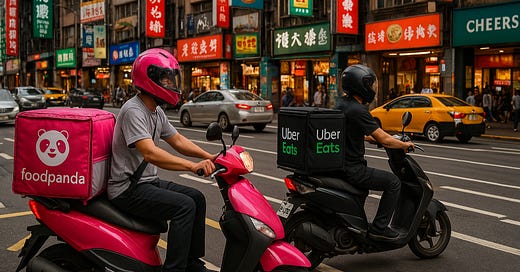📰 Taiwan Blocks Uber's $950 Million Foodpanda Acquisition
The deal is halted due to concerns over reduced competition in Taiwan’s food delivery market.
Taiwan's Fair Trade Commission (FTC) has blocked Uber’s UBER 0.00%↑ $950 million acquisition of Foodpanda’s operations in the country, citing concerns over market competition. The deal would have combined UberEats with Foodpanda, giving the merged companies more than 90% of Taiwan's food delivery market. The FTC warned that this could lead to higher prices for consumers and increased fees for restaurants, as UberEats would have less competition and fewer incentives to lower costs or improve services. The Commission emphasized that the merger’s potential negative impact on competition could not be addressed through corrective measures.
Chen Chih-min, Vice Chairman of the FTC, stated that the merger would eliminate important competitive pressure between the two companies, which could ultimately harm consumers and businesses alike. Uber had hoped that the acquisition would strengthen its food delivery business and bring in at least $150 million in annual profits. However, the deal's rejection by the FTC is a significant blow to Uber’s expansion strategy in Taiwan. The decision underscores the growing global trend of regulatory scrutiny over mergers and acquisitions in competitive markets, where concerns over monopolistic behavior are becoming more pronounced.
Despite Foodpanda's relatively small role in Taiwan’s broader food delivery market, its operations were expected to break even in the near future. The merger, which also included Uber purchasing $300 million in newly issued shares of Delivery Hero, had been seen as an opportunity to consolidate and grow Uber’s presence in the region. Moving forward, Uber and Delivery Hero will likely have to reassess their plans for the Taiwanese market, as regulators continue to keep a close eye on corporate consolidation in the food delivery sector.
Source: Reuters, WSJ
Disclaimer:
The information and opinions provided in this article are for informational and educational purposes only and should not be considered as investment advice or a recommendation to buy, sell, or hold any financial product, security, or asset. The Future Investors does not provide personalized investment advice and is not a licensed financial advisor. Always do your own research before making any investment decisions and consult with a qualified financial professional before making any investment decisions. Please consult the general disclaimer for more details.





